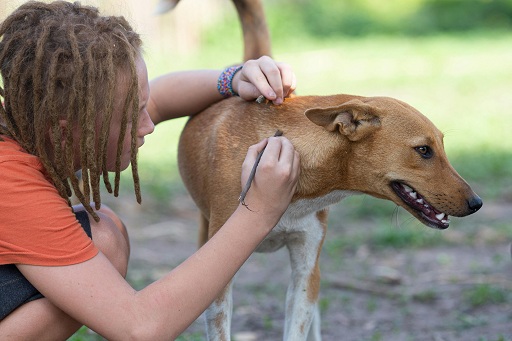
In recent years, pet owners have become increasingly conscientious about the health and well-being of their furry companions. From specialized diets to regular veterinary check-ups, the care provided to pets has evolved significantly. One aspect that is gaining attention is canine dermatology, prompting the question: Can dogs have a dermatologist?
The Rise of Canine Dermatology:
The burgeoning field of canine dermatology has emerged as a pivotal aspect of pet healthcare, mirroring advancements in our comprehension of animal well-being.
Specializing in the identification, management, and prevention of diverse skin disorders in dogs, this discipline tackles a spectrum of issues from allergies and infections to more severe conditions.
As pet owners become attuned to the nuanced needs of their furry companions, the demand for specialized care in canine dermatology intensifies.
Recognizing the pivotal role skin health plays in overall well-being, veterinary professionals increasingly prioritize this field, ensuring comprehensive and tailored solutions for the diverse dermatological challenges faced by man’s best friend.
�
Signs Your Dog Might Need a Dermatologist
Recognizing signs of potential dermatological issues in your dog is vital for their well-being. Keep a watchful eye for persistent itching, redness, hair loss, or alterations in coat condition, as these may signal an underlying skin problem.
Just like humans, dogs can experience a variety of skin troubles, underscoring the importance of prompt attention. Consulting a dermatologist when you observe these symptoms is crucial, ensuring your furry companion receives the specialized care needed for their optimal health and comfort.
Stay proactive and attentive to your dog’s skin health to address concerns promptly and maintain their overall well-being.
Can Dogs Really See a Dermatologist?
Yes, dogs can indeed benefit from the expertise of veterinary dermatologists, a specialized field within veterinary medicine.
These professionals undergo specialized training to grasp the intricacies of skin conditions in animals, allowing them to diagnose and address a wide range of dermatological issues in dogs.
Contrary to the initial perception, canine dermatologists play a crucial role in managing skin disorders specific to dogs, addressing concerns like allergies, infections, and autoimmune diseases.
Their knowledge extends to the unique aspects of canine skin, ensuring accurate diagnoses and tailored treatments. Seeking the assistance of these specialists underscores the significance of comprehensive care for pets, acknowledging the distinct nature of their dermatological needs.
Dog Recovery Sleeve, Washable 2.5mm Thick
Common Dermatological Issues in Dogs
Dogs frequently encounter a spectrum of dermatological challenges, spanning allergies, bacterial infections, parasitic infestations, and autoimmune disorders. Allergies, whether food-related or environmental, can manifest in itching, redness, and rashes.
Bacterial infections, often due to scratches or wounds, may lead to pustules and discomfort. Parasitic infestations, such as fleas or mites, contribute to intense itching and visible skin irritation.
Additionally, autoimmune disorders can prompt the immune system to attack the skin, causing inflammation and lesions. Recognizing these common issues is paramount for responsible pet ownership, enabling proactive measures to prevent and address skin conditions effectively.
Regular veterinary check-ups, a balanced diet, and proper grooming are crucial components of maintaining canine skin health. By staying vigilant and informed, pet owners can foster a comfortable and thriving life for their beloved companions.
The Importance of Proper Skin Care for Dogs
Ensuring the well-being of your canine companion involves recognizing the significance of comprehensive skin care.
Beyond addressing existing skin conditions, establishing a consistent and effective skincare routine is paramount for preventing a spectrum of potential dermatological issues in dogs.
Regular grooming plays a pivotal role, as it not only maintains the cleanliness of your dog’s coat but also enables the early detection of abnormalities or parasites.
A balanced diet complements this regimen, providing essential nutrients that promote skin health from within. Adequate hydration is equally crucial, as it contributes to supple and hydrated skin.
Choosing appropriate grooming products is another key aspect of a dog’s skincare routine. Opting for gentle, hypoallergenic shampoos and conditioners tailored to your dog’s specific coat type ensures a nurturing and non-irritating cleansing process.
Moreover, using specialized products for sensitive areas, such as paw pads and ears, adds an extra layer of care.
By incorporating these practices into your dog’s daily routine, you not only enhance their external well-being but also foster a resilient and thriving skin barrier. Ultimately, investing in proper skincare for your dog is an investment in their overall health and happiness.
Best Dog Shampoos & Conditioners
Consulting a Canine Dermatologist: What to Expect
Choosing a canine dermatologist involves a comprehensive approach to address your dog’s skin-related issues. The initial step typically includes a meticulous examination, where the dermatologist assesses the dog’s skin condition, looking for signs of allergies, infections, or other dermatological concerns.
Diagnostic testing, such as skin scrapings or biopsies, may be conducted to pinpoint the precise cause of the problem.
Following the examination and diagnostics, the canine dermatologist collaborates with pet owners to formulate a personalized treatment plan. This plan considers various factors, such as the dog’s breed, age, overall health, and the specific nature of the skin issue.
Treatment options may range from topical medications and dietary adjustments to more advanced interventions like immunotherapy or specialized dermatological procedures.
Throughout the consultation process, effective communication between the pet owner and the dermatologist is crucial.
Owners can expect to receive detailed explanations about the diagnosis, treatment options, and potential outcomes. Additionally, the dermatologist may offer guidance on preventive measures to maintain the dog’s skin health in the long run.
In summary, consulting a canine dermatologist involves a thorough examination, diagnostic testing, and the creation of a customized treatment plan.
This specialized care aims to address the unique needs of each dog, ensuring optimal skin health and overall well-being. Effective communication between the pet owner and the dermatologist is key to understanding the diagnosis and implementing the recommended treatment with success.
Diagnosis and Treatment of Skin Disease book
Conclusion:
As the field of veterinary medicine continues to advance, so does our ability to provide specialized care for our beloved pets. Canine dermatology is emerging as a crucial aspect of overall pet health, addressing the diverse range of skin conditions that can affect dogs.
Pet owners who prioritize their dog’s skin health by consulting a dermatologist can ensure that their furry companions lead happy, healthy lives.
Further Reading:
Identifying Dog Dermatology Issues
FAQs:
What is a veterinary dermatologist?
A veterinary dermatologist is a specialized veterinarian focused on diagnosing and treating skin, ear, hair, and nail disorders in animals. Trained extensively in dermatology, these professionals address a wide range of issues, including allergies, infections, and autoimmune diseases affecting pets. They conduct thorough examinations, employ diagnostic tests, and develop tailored treatment plans to address each animal’s unique dermatological needs. Veterinary dermatologists may also offer guidance on preventive measures and long-term care to maintain optimal skin health in animals.
�
How do you treat skin problems in dogs?
Treating skin problems in dogs involves a multi-faceted approach. After a thorough examination and diagnostic testing by a veterinarian, treatment options may include topical medications, dietary changes, or oral medications. In more complex cases, specialized interventions like immunotherapy or dermatological procedures may be recommended. Consistent communication with the veterinarian is crucial to monitor progress and adjust the treatment plan as needed. Additionally, preventive measures, such as regular grooming, maintaining a healthy diet, and addressing environmental factors, play a key role in sustaining the dog’s skin health.
�
How do you diagnose skin disease in dogs?
Diagnosing skin diseases in dogs involves a thorough examination by a canine dermatologist, assessing for signs of allergies, infections, or other dermatological issues. Diagnostic testing, such as skin scrapings or biopsies, may be conducted to identify the precise cause. The dermatologist then collaborates with pet owners to formulate a personalized treatment plan, considering the dog’s breed, age, overall health, and specific skin condition. Treatment options range from topical medications to advanced interventions like immunotherapy or specialized procedures. Effective communication between the pet owner and dermatologist is crucial for understanding the diagnosis and implementing successful treatment.
�
How much does it cost for skin disease on dogs?
The cost of treating skin diseases in dogs varies widely based on factors such as the type of condition, severity, and required treatments. Basic consultations may range from $50 to $200, while diagnostic tests like skin scrapings or biopsies can cost between $100 and $500. Medications and topical treatments may range from $20 to $200 per month, depending on the prescription. Advanced procedures or therapies could escalate costs further. Pet insurance may help offset expenses, and consulting a veterinarian can provide a more accurate estimate based on the specific case.
�
Can dogs have a dermatologist near me?
Yes, dogs can have a dermatologist near you. Many veterinary clinics and hospitals have specialized dermatologists who focus on canine skin issues. To find one near you, check with local veterinary practices, animal hospitals, or ask your regular veterinarian for a referral. It’s essential to seek professional advice if your dog is experiencing skin problems to ensure accurate diagnosis and tailored treatment for their specific needs.

https://telegra.ph/Gajki-dlya-separatorov-07-31-2